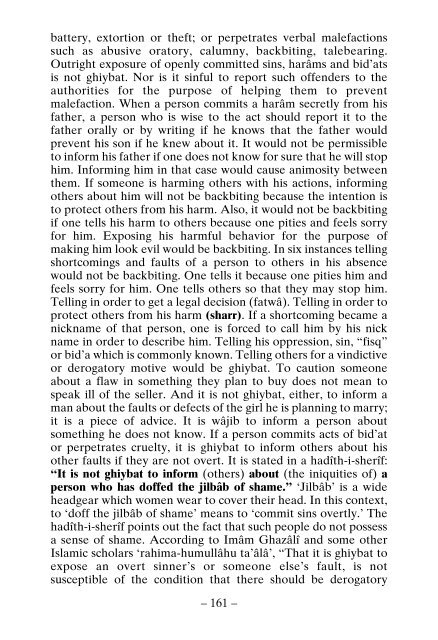Ethics of Islam
Ethics of Islam is taken from the book Berîka by Muhammad Hâdimi. Immorality and ways to get rid of it; 40 depravities and cures to them; usefulness of ethics; what is a soul; strengths of a soul; Personalities emanating from wisdom, courage, chastity and justice are extensively explained.
Ethics of Islam is taken from the book Berîka by Muhammad Hâdimi. Immorality and ways to get rid of it; 40 depravities and cures to them; usefulness of ethics; what is a soul; strengths of a soul; Personalities emanating from wisdom, courage, chastity and justice are extensively explained.
Create successful ePaper yourself
Turn your PDF publications into a flip-book with our unique Google optimized e-Paper software.
attery, extortion or theft; or perpetrates verbal malefactions<br />
such as abusive oratory, calumny, backbiting, talebearing.<br />
Outright exposure <strong>of</strong> openly committed sins, harâms and bid’ats<br />
is not ghiybat. Nor is it sinful to report such <strong>of</strong>fenders to the<br />
authorities for the purpose <strong>of</strong> helping them to prevent<br />
malefaction. When a person commits a harâm secretly from his<br />
father, a person who is wise to the act should report it to the<br />
father orally or by writing if he knows that the father would<br />
prevent his son if he knew about it. It would not be permissible<br />
to inform his father if one does not know for sure that he will stop<br />
him. Informing him in that case would cause animosity between<br />
them. If someone is harming others with his actions, informing<br />
others about him will not be backbiting because the intention is<br />
to protect others from his harm. Also, it would not be backbiting<br />
if one tells his harm to others because one pities and feels sorry<br />
for him. Exposing his harmful behavior for the purpose <strong>of</strong><br />
making him look evil would be backbiting. In six instances telling<br />
shortcomings and faults <strong>of</strong> a person to others in his absence<br />
would not be backbiting. One tells it because one pities him and<br />
feels sorry for him. One tells others so that they may stop him.<br />
Telling in order to get a legal decision (fatwâ). Telling in order to<br />
protect others from his harm (sharr). If a shortcoming became a<br />
nickname <strong>of</strong> that person, one is forced to call him by his nick<br />
name in order to describe him. Telling his oppression, sin, “fisq”<br />
or bid’a which is commonly known. Telling others for a vindictive<br />
or derogatory motive would be ghiybat. To caution someone<br />
about a flaw in something they plan to buy does not mean to<br />
speak ill <strong>of</strong> the seller. And it is not ghiybat, either, to inform a<br />
man about the faults or defects <strong>of</strong> the girl he is planning to marry;<br />
it is a piece <strong>of</strong> advice. It is wâjib to inform a person about<br />
something he does not know. If a person commits acts <strong>of</strong> bid’at<br />
or perpetrates cruelty, it is ghiybat to inform others about his<br />
other faults if they are not overt. It is stated in a hadîth-i-sherîf:<br />
“It is not ghiybat to inform (others) about (the iniquities <strong>of</strong>) a<br />
person who has d<strong>of</strong>fed the jilbâb <strong>of</strong> shame.” ‘Jilbâb’ is a wide<br />
headgear which women wear to cover their head. In this context,<br />
to ‘d<strong>of</strong>f the jilbâb <strong>of</strong> shame’ means to ‘commit sins overtly.’ The<br />
hadîth-i-sherîf points out the fact that such people do not possess<br />
a sense <strong>of</strong> shame. According to Imâm Ghazâlî and some other<br />
<strong>Islam</strong>ic scholars ‘rahima-humullâhu ta’âlâ’, “That it is ghiybat to<br />
expose an overt sinner’s or someone else’s fault, is not<br />
susceptible <strong>of</strong> the condition that there should be derogatory<br />
– 161 –

















